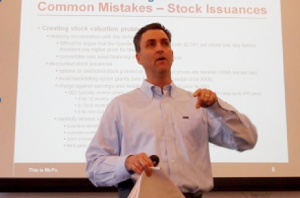
As head attorney of Morrison & Foerster’s Technology Group, Timothy Harris has seen many entrepreneurs and venture capital firms make the same mistakes — ones that could have been avoided if they had consulted a legal professional. In a presentation on Friday during Stanford University’s Entrepreneurship Week, Harris explained how to start a company the legal way.
“I ask company founders, ‘Where did you come up with this license agreement?’ and they tell me that they downloaded it from the Internet, or borrowed it from an old roommate.”
Harris said that although writing legal documents, such as license agreements and privacy policies, with the help of a lawyer can cost money, it is worth the effort to get the details right.
In his presentation, Harris highlighted areas where entrepreneurs often act on intuition or amateur advice. First, he addressed the difference between legal entities: limited liability companies (LLC’s) and corporations.
“I don’t know who’s out there giving the lecture that you should always form an LLC instead of a corporation,” Harris says. Many small businesses want to raise venture capital as an LLC so they can avoid corporate income tax, or “separate taxation.” But in the early stages, Harris observed that these businesses usually run big losses and have no taxable income to speak of.
“It’s a little funny that they focus on the taxes,” Harris says, when the terms of ownership are probably a more important consideration. A startup can make changes to equity ownership more easily with a corporation by issuing new shares, than with an LLC, where the initial contract must be rewritten entirely for each new member.
Harris advises his clients to sort out ownership issues, like who is included as a co-founder, before beginning to raise venture capital. In addition, trying to “play venture capital firms against each other” in a game of price wars is seen as undisciplined behavior by lawyers and firms alike.
“If I want to date a woman, I’m not going to come up to her and say, ‘These other girls are offering to pay for half my meal; Can you match that?'” Harris said. “It’s so odd!”
Instead, Harris recommends that entrepreneurs carefully consider a firm’s track record, compatibility, and flexibility among other factors to make the right funding decision.
Venture capitalists also hesitate to invest in entrepreneurs who have not done “due diligence” on their intellectual property. Failing to license technology, or to identify all other patented technologies in the same space leaves the company in a difficult legal position. Working on a startup idea before leaving a previous job could also create IP issues. Harris said “the risk-averse founders who keep their day jobs until their new company gets Series A funding are more liable for IP lawsuits than those who leave their job before pursuing the startup.”
Once a company is established and hiring new people, an error Harris commonly sees is the misclassification of employees as independent contractors or consultants. The IRS uses a 20-factor test to ensure that all employees are taxed properly, including questions like, “Does this person have an e-mail address registered to your company?” It is important to remember that only actual employees can receive incentive stock options, or ISO’s.
Harris and other technology lawyers realize that the process of starting a company and fundraising is already difficult. But when it comes to all kinds of legal issues, Harris believes that startups can “pay a little now” to hire a lawyer, or “pay a lot later” in lost funding, lawsuits or tax problems.
Stanford Entrepreneurship Week 2012 takes place February 27 through March 7. This collection of over 30 events is hosted by the Stanford Entrepreneurship Network (SEN), a federation of programs, student groups and organizations supporting entrepreneurship in the Stanford community. For a complete listing of events check: https://sen.stanford.edu/e-week/calendardu/e-week/calendar

Very informative and touched on some issues related to a 501c 3 corporation work with on a regular basis.
Thanks for the brief clear explanation of several technical terms.
Great article!